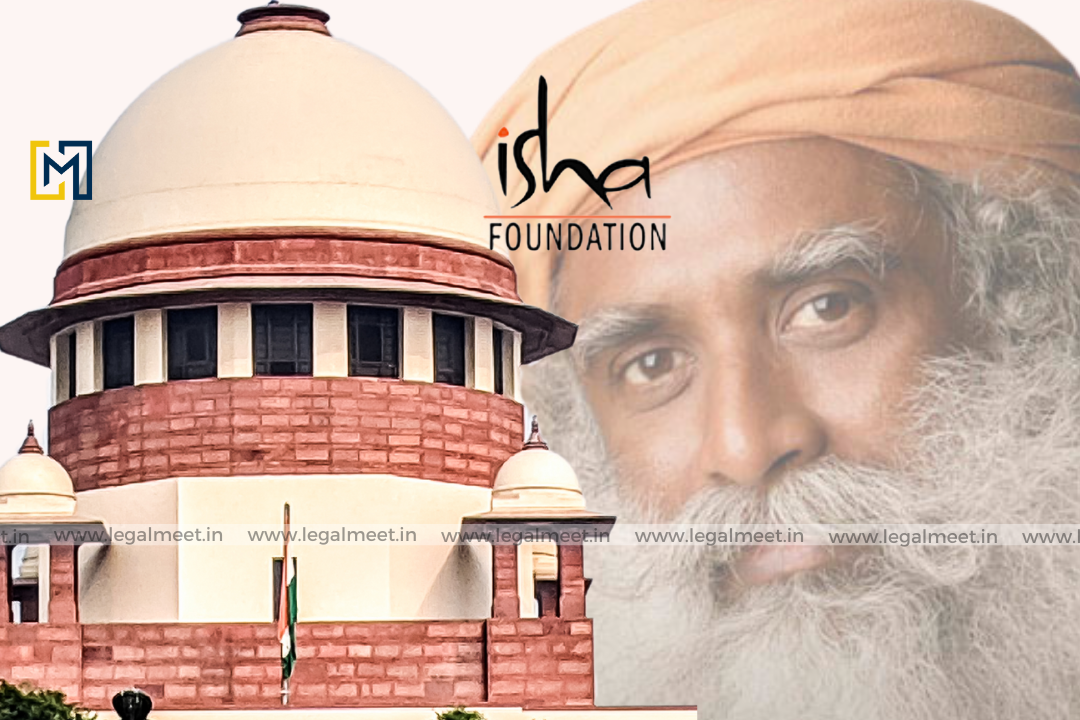
"Supreme Court Closes Habeas Corpus Petition Against Isha Yoga Centre"
The Supreme Court closed a case on October 18 where a father claimed that his two daughters were being held against their will at Sadhguru's Isha Yoga Centre in Coimbatore. The daughters, aged 42 and 39, told the court that they were staying at the ashram by their own choice. The court also criticized the Madras High Court for ordering a police investigation into other issues related to the Isha Yoga Centre as part of this case. Chief Justice of India DY Chandrachud, along with Justices JB Pardiwala and Manoj Misra, said that since the daughters are adults and the purpose of the case was resolved, there was no need for the High Court to take any further action. Earlier, the Supreme Court had taken over the case from the Madras High Court. "The jurisdiction of the court under Article 226 while dealing with habeas corpus is well defined and it would be unnecessary for this court to expand the ambit," the bench noted. The Chief Justice said that these legal proceedings should not be used to damage the reputation of people or institutions. The court was discussing the Isha Foundation's challenge to a Madras High Court order. The High Court had directed the police to investigate inside the Isha Yoga Centre, based on a father's claim that his two daughters were being held there against their will. Senior Advocate Mukul Rohatgi, representing Isha Foundation, argued that even the Tamil Nadu police's report showed that the two women were staying at the ashram by their own choice. He said that the High Court should have closed the case when this was confirmed, instead of asking the police to investigate further. Senior Advocate Mukul Rohatgi argued that the Madras High Court's actions in the habeas corpus case were unnecessary and affected the reputation of the Isha Foundation, which has many followers. Senior Advocate Siddharth Luthra, representing the Tamil Nadu government, asked the Supreme Court to make it clear that closing the habeas corpus case wouldn’t stop the police from investigating other matters. Rohatgi opposed this idea, saying it could be used by people with hidden motives to unfairly target the Isha Foundation. Solicitor General Tushar Mehta supported Rohatgi, saying that if the court mentioned anything about an investigation, misleading news articles might be published suggesting that the Supreme Court ordered an inquiry against the ashram. The Supreme Court then clarified that they were only closing the habeas corpus case and were not commenting on any other issues related to it. Chief Justice of India (CJI) said that the Supreme Court was only focused on the habeas corpus case and that the Madras High Court should not have commented on other issues involving the Isha Yoga Centre. During the hearing, it was noted that the police found some problems during their visit, like an expired license for the X-ray machine and the absence of an Internal Complaints Committee (ICC). The court made it clear that these issues should be handled separately, and Isha Foundation's lawyer assured that they would be addressed. The court also spoke to the lawyer representing the father of the two women staying at the Isha Yoga Centre. The CJI reminded him that since his daughters are adults, he cannot file a complaint to control their lives. The lawyer argued that he was worried because one of his daughters had said she was fasting until death. The CJI advised him that instead of filing legal cases, he should try to build a trusting relationship with his adult children. The CJI also questioned whether the father's true intention was to help his daughters or if he was acting for some other reason, like a political agenda. The Solicitor General added that the father's concern seemed to be just a pretense and that fear for their daughters is understandable for elderly parents. The court told the father to visit his daughters directly and ruled out sending the police to the ashram. Finally, the court dismissed attempts by the OBC Mahasabha, a group trying to raise other issues against the Isha Yoga Centre, stating that they would not be heard in this case. In a recent case, the Supreme Court stopped the Tamil Nadu police from investigating the Isha Yoga Centre and took over a habeas corpus petition that was previously being handled by the Madras High Court. The Supreme Court asked the police to provide a status report. The Supreme Court judges spoke directly to the two women monks involved. The women said they were not being forced to stay at the ashram and were free to leave whenever they wanted. They also said that their parents had visited them at the ashram multiple times, and one of the women even recently took part in a 10-kilometer marathon. The case began when a father filed a petition in the Madras High Court, claiming that his two daughters, aged 42 and 39, were being held against their will at the Isha Yoga Centre and were being brainwashed. Although the daughters told the High Court that they were staying there by choice, the High Court still raised concerns about the ashram and asked for details of criminal cases against the Isha Foundation. The High Court also asked the Coimbatore police to look into POSCO allegations, including a case involving a doctor at the ashram and claims that people were being held there against their will. Case: ISHA FOUNDATION Versus S. KAMARAJ AND ORS.SLP(Crl) No. 13992/2024 www.legalmeet.in
